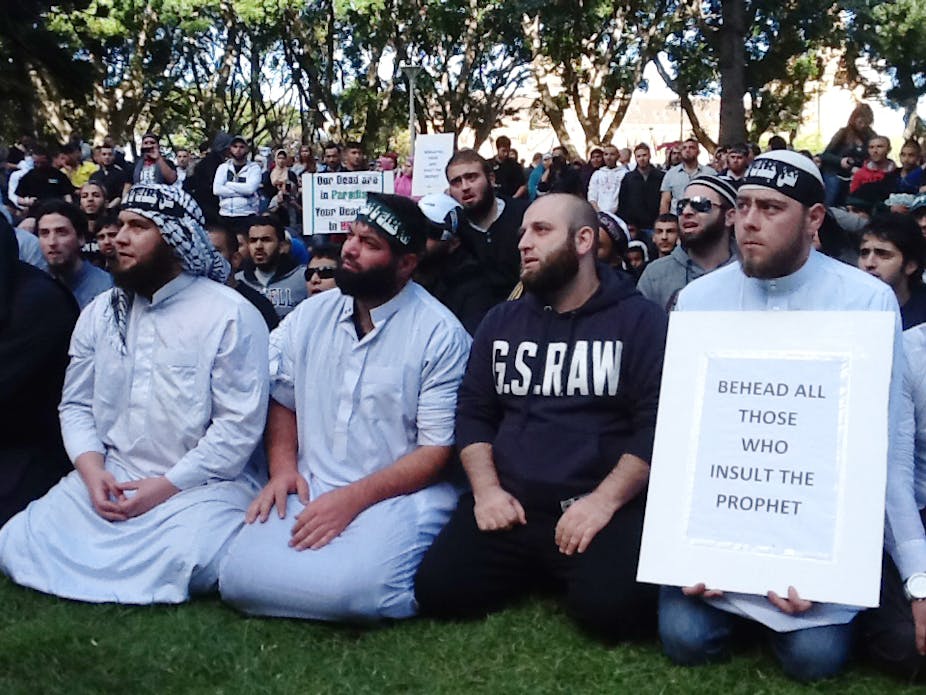The couple of hundred young Muslims that streamed into Sydney city on the weekend amid violent clashes with police riot squad members offered a visually spectacular contrast to the nominal picture postcard view of Sydney.
In recent times a protest such as this would have contributed to a moral panic in the wider community, with unconsidered and highly inflammatory rhetoric directed towards Australian Muslims.
Thankfully Australian political leaders, Muslim community representatives, NSW police and mainstream media have been quick to point out that those involved represent a small minority.
All sides of politics have unequivocally condemned the film Innocence of Muslims that was the focus of global protests, with Prime Minister Julia Gillard describing the film as “truly repulsive”. Communications Minister Stephen Conroy has sought to have YouTube (through their owner Google) remove the film for inciting racism.
Added to this, the Australian Foreign Minister Bob Carr has tasked all Australian diplomatic posts to “redouble efforts” to closing the gap between Islamic and Western societies.
It is instructive that the greatest gains appear to have been made within the Liberal Party. Less than a week ago, Ned Mannoun, a Lebanese-Australian Muslim, became the first Muslim and Liberal Mayor of Liverpool in a traditional Labor heartland. Tony Abbott claimed he did not believe that the people on the streets of Sydney yesterday were truly representative of Islam.
NSW Premier Barry O’Farrell stated:
What we shouldn’t do is condemn the great bulk of Muslims by the actions of a few extremists, any more than you should do with Catholics, Buddhists, Hindus or others.
These public comments reveal a pointed contrast to approaches over the past decade.
Muslim community leaders who may have once remained silent have also been quick to condemn the violence. The Mufti of Australia, Dr Ibrahim Abu Mohammad released a public statement condemning the movie as well as condemning actions of “violence and lawlessness”.
A collective media release from Australia’s largest Muslim organisations including the Islamic Councils of NSW and Victoria, Lebanese Muslim Association, Australian National Imams Council and United Muslim Women Association similarly condemned the content of the film while simultaneously stating that such insults “do not provide individuals with the right to act violently against others”.
The NSW Police Commissioner Andrew Scipione has thanked Muslim community Leaders for their “responsible handling of a very bad incident”. This reflects an unprecedented level of co-operation and mutual understanding between organisations that have stood in stark opposition in previous years.
Such responses across the political spectrum, reinforced by an improved level of balance in media coverage, reveal that the time-consuming and complex work of relationship building, introspection and the institutional strengths of Australian multiculturalism have brought about real progress in the past decade. Yet it is clear that significant challenges still exist.
While Sydney’s Muslim communities undoubtedly have a number of hardliners committed to claiming exclusivity of their view and condemning Western life, many of these protesters were young men and women that continue to feel disenfranchised within Australian society based on very high levels of unemployment, difficulty accessing educational opportunities and significantly higher than normal rates of poverty and imprisonment than non-Muslims.

Research by Professor Riaz Hassan (utilising the benchmark for poverty of $650 total household income weekly) has revealed that twice as many Australian Muslim children (40%) are likely to live in poverty than non-Muslim children (19%). Census data from 2001 and 2006 reveals that Muslims face incredibly high levels of unemployment (up to 30%) in areas such as the inner west in Melbourne and Western Sydney. For many of these young people, Islam offers a sense of community, support, belonging and empowerment that stands in contrast to the notion of Australian citizenship, rather than complimenting it.
In Sydney, where many community leaders are from an older generation of foreign born, middle-aged men, young hardliners offering an alternate source of recognition through an extremist form of Islam are seeking to further polarise the community.
On Saturday they sought to hijack the legitimate concerns of Australian Muslims to increase their currency with the most marginalised, as well as to polarise debate. The official condemnations of the violence by politicians and community leaders, while encouraging, will have no effect upon the success of these hardliners. In fact such statements may reinforce their symbolic capital amongst this group.
It is only through collective action to address underlying problems – endemic poverty, low levels of access to education, unemployment, imprisonment and a lack of respectful engagement at the grassroots level – that hardline narratives can be effectively challenged.
It is this, the creation of meaningful paths to upward social mobility for young Australian Muslims, in which Islam and Australian citizenship are mutually beneficial, which must accompany the progress made at the political level.
This is the difficult yet vital work of multiculturalism for the foreseeable future.

